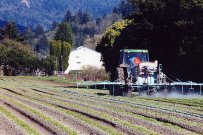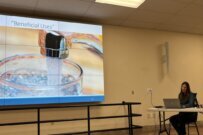It’s probably safe to say that no one likes using pesticides. Even Easter lily farmers have told me that “we don’t like using them,” adding that they have “no choice.” The lily bulb crops would be ruined, they say, without the 300,000 pounds of dangerous chemicals they apply each year to farmlands that surround the Smith River estuary and border residential neighborhoods and an elementary school.
Certainly farming is economically fraught. The weather, the pests, the whims of fickle consumers. Individually and combined, the challenges facing farmers are many.
Personally, I have worked for fifteen years to get these dangerous chemicals out of the lower Smith River. In that time I have come to know Easter lily bulb producers as small-town family farmers who love their families, their work, and their communities. Pesticides and petrochemical fertilizers offer them a Faustian bargain of predictability in an industry that can otherwise be wholly unpredictable. I understand their dilemma.
But the pesticides have to go. Water testing has shown that these chemicals are attacking the precious aquatic life of the Smith River estuary. Now, Siskiyou Land Conservancy’s Smith River Community Health Assessment demonstrates that people are suffering as well. No matter how deeply I understand the economic plight of lily growers, I still can’t accept their intensive use of very dangerous chemicals in a small, concentrated area to produce an ornamental flower. Clearly there is a better way. It’s the 21st century, and organic is mainstream.
One reason I founded a land trust was to work with people, instead of against them, to achieve environmental protection. The mission of Siskiyou Land Conservancy includes support of farmers. In this spirit we have asked Easter lily growers to join us in a negotiation process that would result in a total elimination of Smith River of pesticides that are not allowed under national organic standards. During negotiations we will actively support federal and state funding to allay any economic risks lily farmers may encounter during such a transition.
Make no mistake, if negotiations fail, we will do what it takes to rid the Smith River estuary of these toxic chemicals. However, we hope that negotiations might finally, and peacefully, rescue the lower Smith River from the scourge of pesticides while allowing Easter lily farmers to maintain profitable and sustainable operations. At that point Siskiyou Land Conservancy can fully return to the work we do best: assisting willing landowners, and farmers, to protect critical North Coast habitats in perpetuity.

